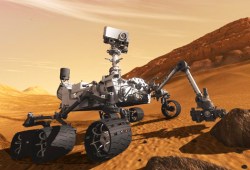
When the Voyager spacecraft left Earth in 1977, it carried music in case it was ever encountered by aliens. If extraterrestrial beings have found it and downloaded its contents onto their iPods, they’re now listening to Mozart, Beethoven, and Chuck Berry, among others. When the Curiosity rover landed on Mars earlier this year, it beamed back will.i.am — and imagine, some people actually question our technological advances!
So what, exactly, is Curiosity doing out there? And what have we found so far? I recently sat down with Ken Herkenhoff, a planetary geologist for the U.S. Geological Survey and co-leader of the ChemCam team for Curiosity. ChemCam is that piece of technology that lasers rocks so we can learn what they’re made of. I talked with Herkenhoff about the rover itself, the gadgets on board, and the dicey “seven minutes of terror” involving the rocket-powered “sky crane” that lowered the rover to the Martian surface.
Now that we’re there, Herkenhoff explains that, “it looks like we landed in the outer parts of an alluvial fan” — confirming longstanding suspicions that there was once an abundance of water on Mars. But this finding is just the beginning of what Curiosity might accomplish. Two weeks ago, one of the mission’s principle investigators, John Grotzinger, told NPR the rover had found something “for the history books,” but refused to elaborate until the team had a chance to check its findings.
For those who feel horribly teased (NASA has promised more information in December), Herkenhoff offers his own list of potential “touchdown” discoveries, including ocean beds and organics — the carbon-based building blocks of life. We also spent some time talking about the rover’s cultural impact and why the team at NASA and the USGS call Curiosity “she.” So suit up and have a listen!
This interview is part of the Generation Anthropocene project, in which Stanford students partake in an inter-generational dialogue with scholars about living in an age when humans have become a major force shaping our world.




